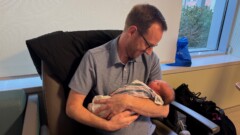Last weekend I made the rookie mistake of leaving my book at the office. Rather than blow time on a one-hour round-trip to fetch it, I decided instead to search for something new. Something different. Something interesting. Preferably, something moving. I spent a full hour browsing Amazon without success and then began to scour the sites of the various Christian publishers. It was at Zondervan’s site that I spotted something hopeful—A Dream So Big: Our Unlikely Journey to End the Tears of Hunger by Steve Peifer. Two minutes and eight dollars and eight-nine cents later, it was on my Kindle. It was just the right book.
A Dream So Big tells the story of Steve and Nancy Peifer. In the late 90’s, right at the peak of the dot com boom, Steve was a corporate manager for a major software and consulting company; he was making a good living and enjoying life in America. He and his wife had two boys and all the comforts they could want. In 1997 the Peifers found, to their surprise, that they were expecting their third child. However, doctors soon brought them the heart-breaking news that their child had a chromosomal abnormality that would be “incompatible with life.” Against the counsel of physicians, they chose to carry their son to term and spent eight blessed days with him before he died.
The grief over the loss of their son made them re-examine their lives and priorities. Nancy had always dreamed of being involved in foreign missions and Steve decided the time was right to grant his wife her dream. They learned of an opportunity in Kenya at the Rift Valley Academy, a boarding school for the children of missionaries. They raised funds, packed their bags, and headed overseas as unlikely missionaries.
By the time the book comes to a close, Steve is on a stage with Tyra Banks, receiving a humanitarian award from CNN for the work he has done in Kenya. While serving the students of the Academy he had also begun a program that would grow to feed 20,000 children every day; he also founded computer centers in schools, offering the children a key component of a modern education that would otherwise be denied them. The book describes this remarkable journey and the transformation of a man who left behind the American dream to pursue a much bigger, much better, much more satisfying dream.
The book has much to commend it. Peifer perfectly combines pathos and humor, moving seamlessly between laughter and tears. He is able to poke fun at what is ridiculous while drawing attention to what is moving. This quote highlights his self-effacing humor:
The clip ended, the lights came back up, and it was suddenly time for me to just roll with it yet again. Because who better to present an award to a fifty-two-year-old missionary working with poor, hungry children in Kenya than a Sports Illustrated swimsuit model? In another day in some alternative universe, it might have made perfect sense. But in the here and now of New York City in front of a worldwide television audience, it was time for me to focus as Tyra Banks walked to the podium to announce, “It is my honor to present the CNN Hero for Championing Children, Steve Peifer.”
And then he stepped on her dress.
The book also has important spiritual insights. Here is one that will no doubt resonate particularly with those who serve in foreign lands where getting things done nearly always depends upon theft and bribery: “In the end, the banality of evil is what exhausts you. You can battle against an evil terrorist; how do you fight an underpaid clerk following stupid orders?” While we often focus on the evils of the world’s great leaders, evil’s grasp extends all the way to the lowest and most poorly-paid bureaucrat.
Peifer also shows that normal people, otherwise unremarkable people, can pursue a dream and make a difference. He is a very normal man with a very normal family who has touched the lives of tens of thousands of people, and all for the glory of God.
A Dream So Big is not a theology of missions or a deep, doctrinal examination of the need the methods of mission. Neither is it meant to be. Instead, it’s a ground-level look at one family’s work in a needy place. It is real and honest: “As a missionary, I am ashamed to admit I don’t like living by faith; I’d much rather have the money in hand than to know I’m going to have to trust God for it. But when I see him move, and know it could only be him, that is perhaps the sweetest experience on earth.” It is wonderfully-written and thoroughly enjoyable; I highly recommend it.










